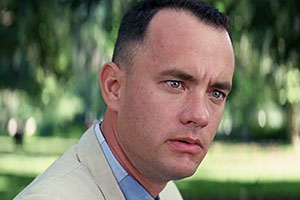Forrest Gump was never given an official diagnosis in the 1994 film. The movie depicts him with an intellectual disability and an IQ of 75, but many autism researchers and ABA professionals have noted that his behaviors closely mirror autism spectrum traits: intense focus, social literalness, repetitive routines, and exceptional pattern-based skills. He likely reflects both.
If you’ve ever watched Forrest Gump and felt a flash of recognition — not just as a movie fan, but as a parent, a therapist, or someone who loves a person on the spectrum — you’re not alone. That feeling has a name, and it’s been studied.
Forrest isn’t an autism diagnosis waiting to happen. He’s a fictional character written before autism was widely understood. But the traits Winston Groom built into him, and that Tom Hanks brought to life on screen, overlap with autism spectrum disorder (ASD) in ways that resonate deeply with families and ABA professionals alike.
So let’s actually answer the question.
What Did Forrest Gump Have?

In the film, Forrest is described as having an IQ of 75 and wearing leg braces as a child due to a spinal condition. His mother works hard to get him into mainstream schooling, which places him in the borderline to mild intellectual disability range based on IQ alone, as it was often portrayed in mainstream media at the time.
The word “autism” never appears in the movie. Director Robert Zemeckis and author Winston Groom have never said Forrest was autistic. When Groom wrote the novel in 1986, autism was far less publicly understood, and the modern DSM-5 framework we use today did not yet exist.
That said, at least one published analysis has applied DSM-IV criteria to the character as depicted in the novel and argued that he would meet diagnostic criteria for autistic disorder, with alternative developmental diagnoses considered less consistent with his overall presentation.
So the honest answer is this: Forrest was written as a character with an intellectual disability. But the traits that make him feel so familiar to the autism community are real, intentional, and worth examining.
The Autism Traits That Feel So Familiar
When ABA professionals watch Forrest Gump, certain scenes land differently than they do for a general audience. Here’s what stands out.
Literal interpretation of language
When his drill sergeant tells him he’s a “goddamn genius” for answering a direct question directly, Forrest takes the compliment at face value. He doesn’t pick up on sarcasm. He doesn’t read the room. He answers what was asked, exactly as asked — and it works out beautifully, which is part of the joke. But for people who work with autistic individuals, it’s also deeply recognizable.
Exceptional focus in structured environments
Give Forrest a clear task with clear rules, and he excels. Table tennis is the clearest example. Told to never take his eye off the ball, he never does — not once, through thousands of hours of practice. That isn’t stupidity. That’s the kind of singular, almost meditative focus that shows up frequently in people on the spectrum, particularly when the activity has predictable rules and measurable outcomes.
Repetitive behavior channeled into extraordinary achievement
Forrest runs. Not because he has a training plan, but because running is what he does. What starts as fleeing a threat becomes a cross-country journey that captures national attention. ABA therapists may work to channel certain repetitive behaviors into functional or goal-directed activities when appropriate. Forrest’s mother did something similar — intuitively, without the clinical framework.
Social obliviousness that isn’t unkindness
Forrest isn’t mean. He isn’t calculating. He just doesn’t read social dynamics the way most people do. He forms deep attachments — to Jenny, to Bubba, to Lieutenant Dan — and is completely loyal within those relationships. But the broader social landscape, the subtext, the unwritten rules of what you’re supposed to say in a given situation, mostly pass him by.
These traits don’t make Forrest autistic by modern diagnostic standards. But they explain why many in the autism and ABA communities have informally embraced him.
What ABA Professionals Notice
Applied behavior analysts who work with autistic clients often recognize something in Forrest’s journey that goes beyond the character traits. They recognize the interventions.
His mother functions as a de facto behavior support specialist throughout his childhood. She reframes his differences as strengths (“stupid is as stupid does”). She finds environments where his focus is an asset rather than a liability. She pushes for mainstreaming when the system wants to exclude him. And she redirects his energy — his running, his intensity — into something he can be proud of.
That’s not clinical ABA. But the underlying logic is familiar: meet the person where they are, build on what works, and don’t let a label become a ceiling.
The relationship between Forrest and his various mentors — his drill sergeant, his ping-pong coach, Bubba’s shrimping knowledge — also reflects something ABA professionals know well. Structured environments with clear expectations bring out the best in people who struggle with ambiguity. Forrest doesn’t need less structure. He needs the right structure.
Why This Question Still Matters
People have been asking whether Forrest Gump is autistic for thirty years, and the question isn’t going away. That’s worth thinking about for a moment.
Part of it is that the film came out at a cultural inflection point. Autism diagnoses rose sharply through the 1990s, largely due to expanded diagnostic criteria, improved screening, and increased awareness. Families who had never heard the word “autism” in 1994 were hearing it constantly by 2000. When they looked back at Forrest — a character they’d loved, who’d made them laugh and cry — they saw their child’s behaviors reflected back at them. That’s powerful.
Part of it is also that Forrest Gump represents something important about how we talk about neurodivergence. He’s not a cautionary tale. He’s not a tragedy. He’s a person who leads a full life, forms deep relationships, serves his country, builds a business, and becomes a father. His differences are part of him, not a cage.
For a community that has fought hard against deficit-based narratives about autism, Forrest’s story — whatever diagnosis you apply to it — lands differently than most Hollywood portrayals.
Frequently Asked Questions
Was Forrest Gump officially diagnosed with autism in the movie?
No. The film never uses the word autism. Forrest is described as having an IQ of 75 and an intellectual disability. However, many researchers and ABA professionals note that his behavioral traits closely align with autism spectrum characteristics, including social literalness, intense focus, and repetitive behaviors.
What is the difference between intellectual disability and autism?
These are distinct conditions that can, and often do, co-occur. Intellectual disability refers to significant limitations in intellectual functioning and adaptive behavior. Autism spectrum disorder involves differences in social communication, sensory processing, and behavioral patterns — and it appears across the full range of IQ levels. A person can have both, either one, or neither.
Did the author of Forrest Gump intend the character to be autistic?
There’s no evidence that Winston Groom wrote Forrest with autism in mind. The novel was published in 1986, when autism was far less publicly understood, and the modern DSM-5 framework didn’t exist yet. Groom has not commented publicly on the autism interpretation of his character.
Why do so many autism families connect with Forrest Gump?
The traits Forrest displays — social literalness, exceptional focus in structured situations, deep loyalty within close relationships, and repetitive behaviors channeled into extraordinary outcomes — reflect real experiences that many autistic individuals and their families recognize. The film also portrays Forrest with warmth and dignity, which resonates with a community that is often underrepresented in media.
What does ABA therapy have to do with Forrest Gump?
Applied behavior analysts who work with autistic clients often recognize in Forrest’s story the same principles that guide ABA practice: building on strengths, using structure to support success, and redirecting behaviors into positive outcomes. Forrest’s mother, in particular, demonstrates many of the supportive strategies that inform modern ABA approaches.
Key Takeaways
- Forrest was written as a character with an intellectual disability, not autism — though the two can co-occur, and his behavioral traits overlap significantly with autism spectrum characteristics.
- At least one published analysis applied DSM-IV criteria to the character and argued he would meet diagnostic criteria for autistic disorder based on the novel’s evidence.
- Four core traits drive the autism community’s connection to Forrest: literal language interpretation, exceptional task-specific focus, repetitive behaviors, and social obliviousness without unkindness.
- ABA professionals often recognize familiar principles in Forrest’s story — structured environments, strength-based framing, and behavioral redirection toward meaningful outcomes.
- Forrest Gump matters to the autism community in part because he’s portrayed as a full human being, not a diagnosis, which remains rare and meaningful in popular culture.
Curious about how ABA principles apply in the real world? Whether you’re a parent looking for answers or a student exploring the field, there’s a path forward worth exploring.









